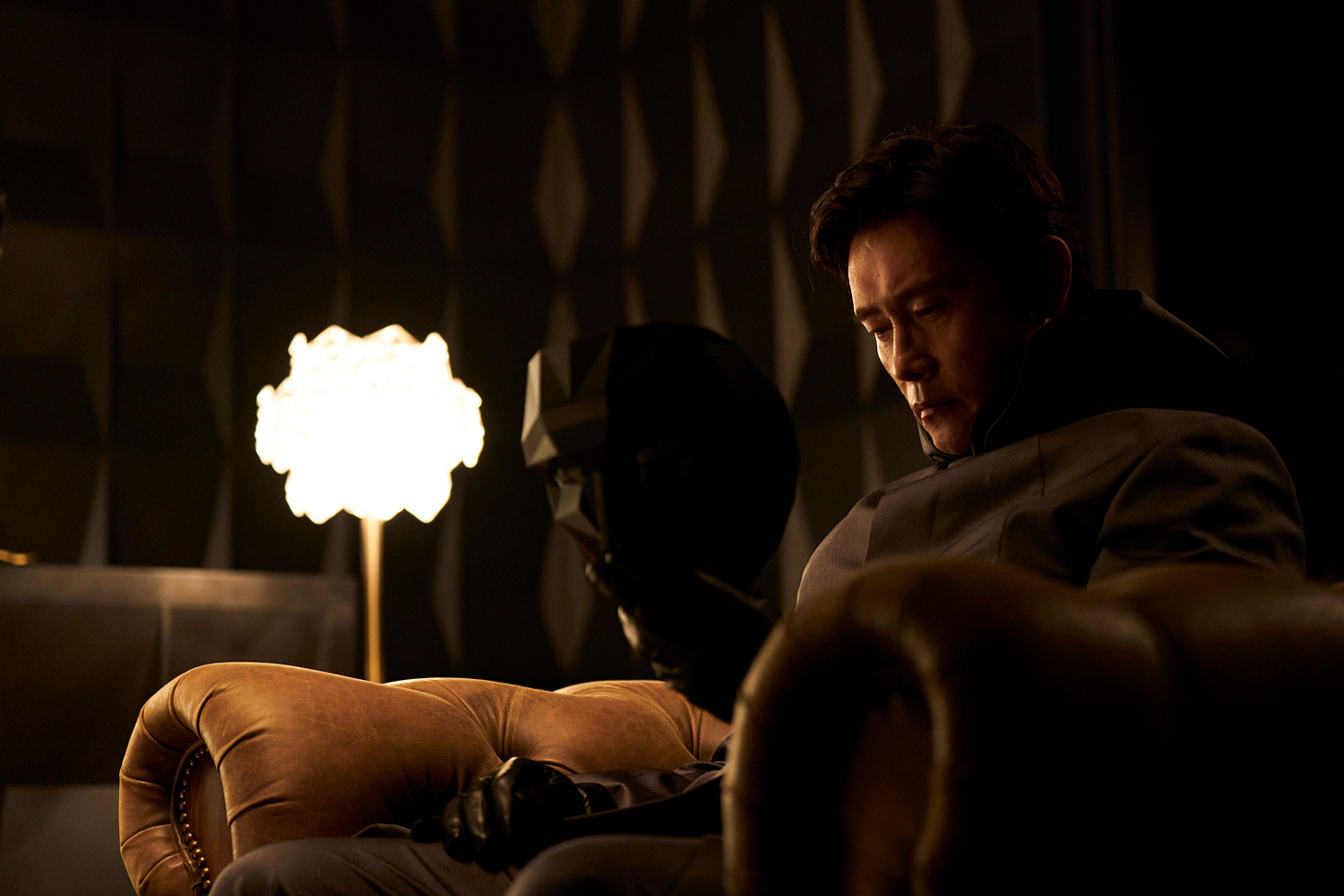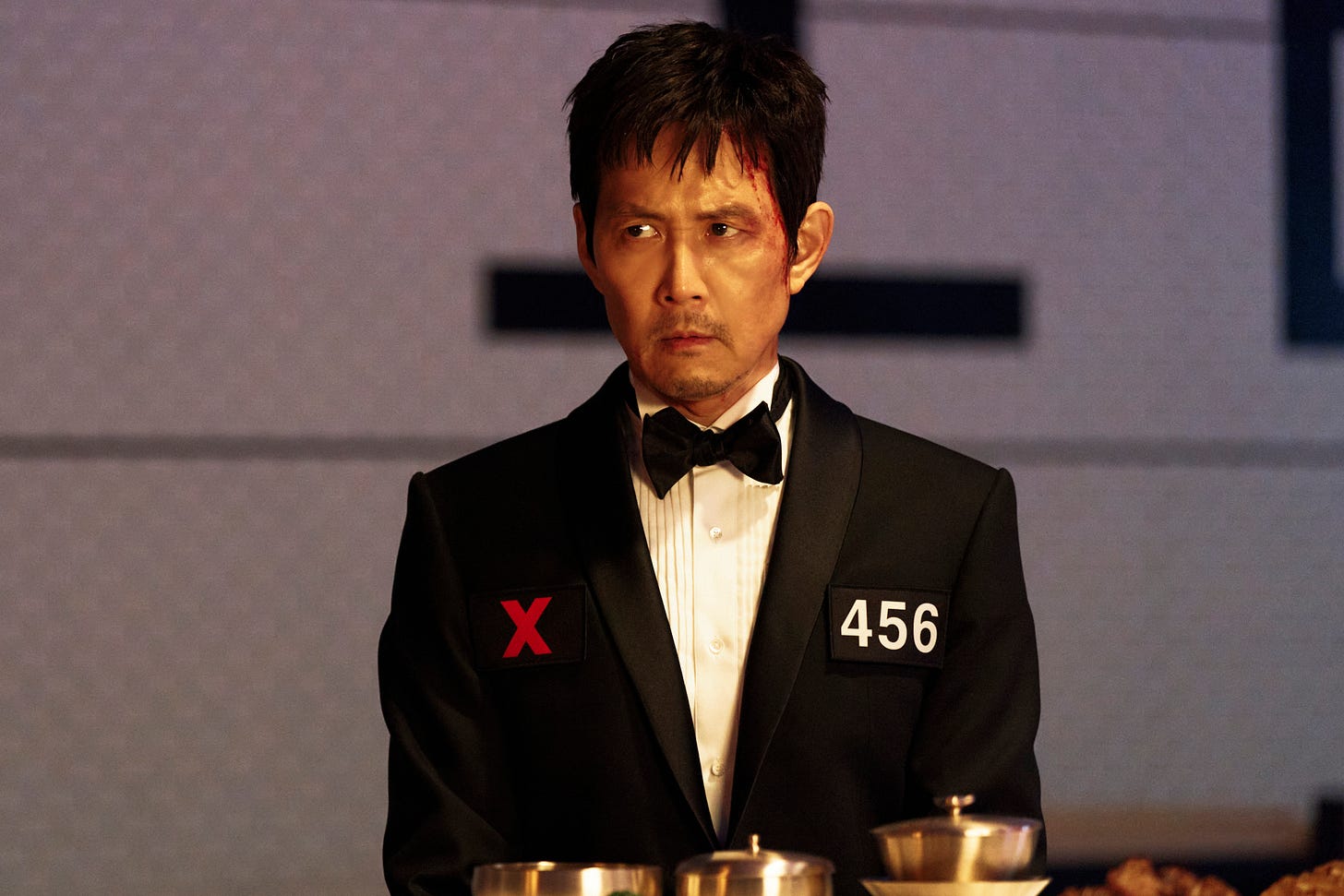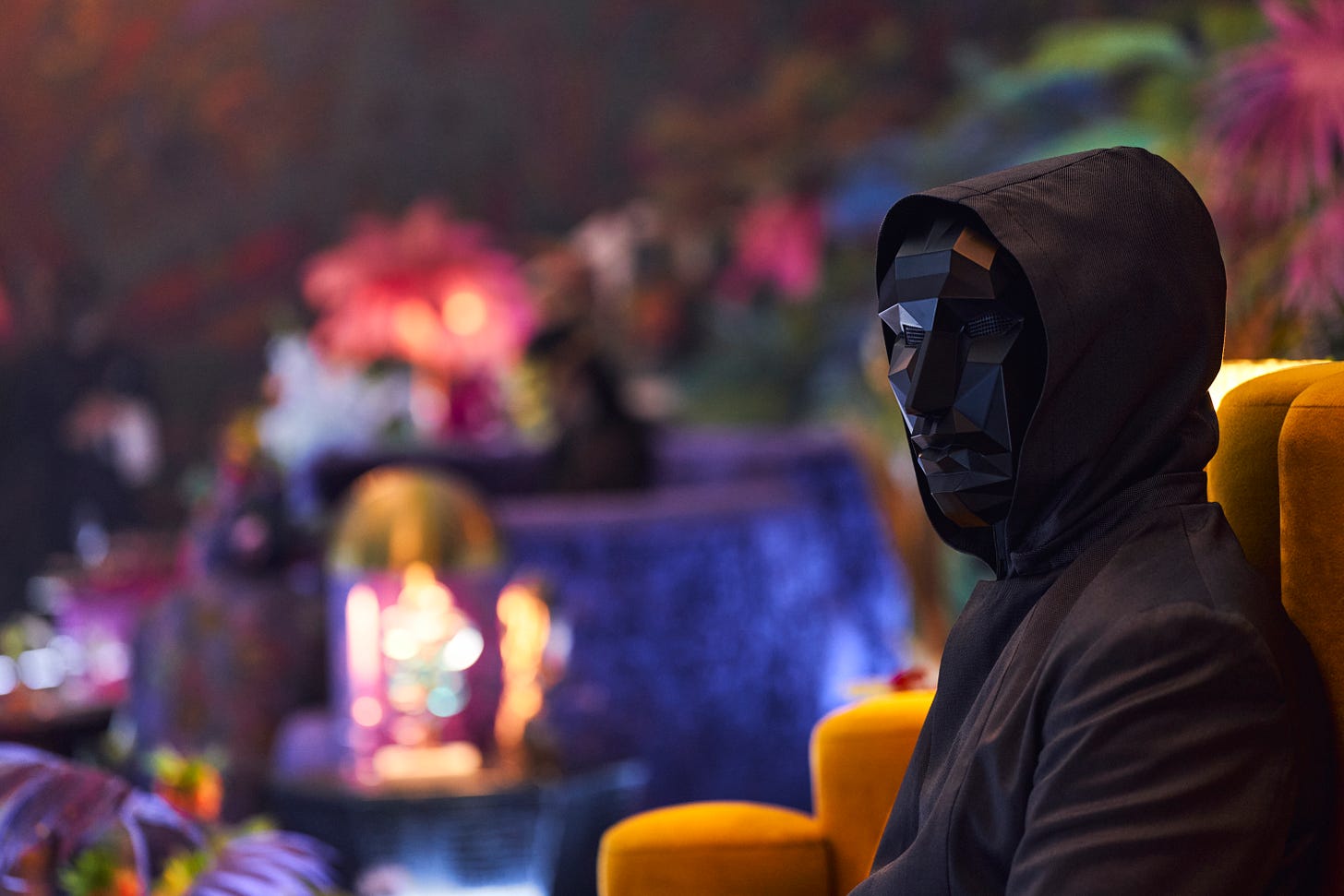Squid Game 3: Game Over
A conversation with director Hwang Dong-hyuk, Lee Jung-jae, and Lee Byung-hun
The game is over. What began in 2021 as a global phenomenon of bloody mayhem and dark social satire has reached its definitive conclusion. Across three seasons, Squid Game introduced us to a desperate cast of characters—some deeply relatable, others intensely hateable—only to watch them fall, one by one. Their brutal, childish games served as a grim mirror, reflecting the stark inequalities and moral compromises of our own world.
Each season examined a different stage of societal decay through the lens of the intensely deadly games players had to endure. Where Season One explored the brutal desperation of capitalism, Season Two delved into the problems of politics and factionalism.
The final season poses the ultimate question: a belief in humanity itself. Will we survive? Can we? Do we even deserve to? At the heart of this brutal exploration was a simple, sadistic premise.
The carrot: a massive cash prize that grew with each player’s elimination. The stick: Every game was lethal, and to be eliminated was synonymous with a violent death, often at the hands of the other players.
At the center of the story is the journey of Seong Gi-hun (Lee Jung-jae), who transforms from a man on the edge of financial ruin into a vengeful hero determined to dismantle the games. Opposing him is the brutal and enigmatic Front Man (Lee Byung-hun), Gi-hun’s foil and the master of the games.
In this conversation, we talk with both actors, along with the show's creator and director, Hwang Dong-hyuk, to dissect the show's final themes, the challenges of bringing it to a close, and its lasting legacy.
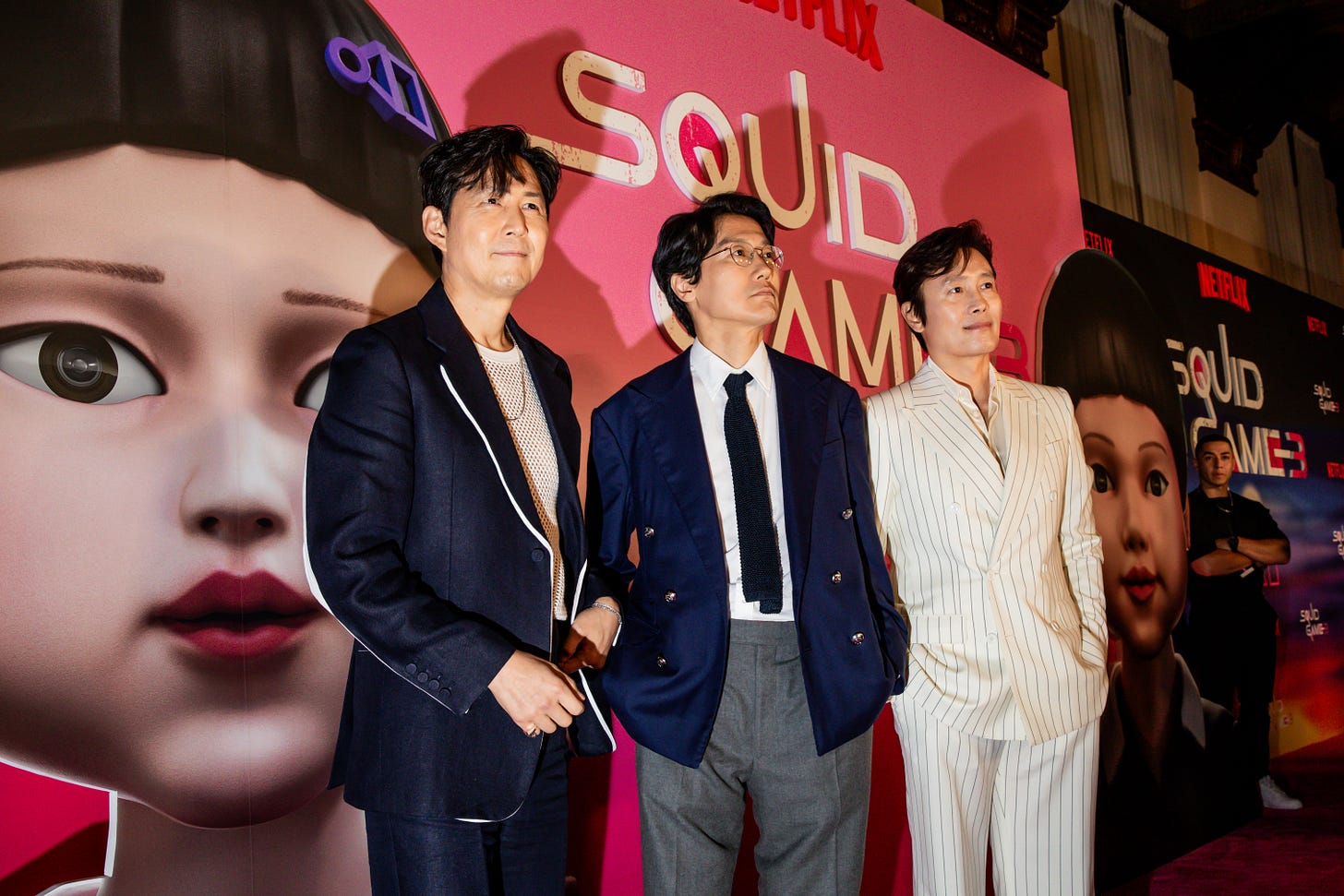
A Question of Humanity
With its final season, Squid Game moved beyond its previous critiques to ask a more fundamental question. Director Hwang Dong-hyuk explains that while the first two seasons tackled specific societal ills, the concluding chapter aimed for something far more profound. "I think season one of Squid Game focused on the reality of capitalism, while season two focused on political realities, including elections or voting," Hwang says.
For the grand finale, he shifted his focus inward, toward the very core of human nature. "I would say that the focus of season three is: in this world that seems to become worse economically, politically, and in many social issues, I wanted to ask the question, 'Do we have what it takes for us to be able to protect humanity, trust in that humanity, and come together for a better future and create a better world?'"
This philosophical quest became the central pillar of Gi-hun's final journey. According to Hwang, his arc was designed to make the audience reflect on their own world. "As all of the audiences follow along on Gi-hun's journey," he hopes, "you can all ask yourselves the question, 'In this world that continues to fuel incessant human greed and where we continue to express immense rage and conflict against one another, do we still have hope in this world, and can we make the world a better place for the future generation?'"
The Ultimate Showdown
The philosophical question of the final season crystallizes in the inevitable confrontation between its two central figures: Gi-hun and The Front Man. According to director Hwang Dong-hyuk, this was never going to be a simple physical fight, but rather a battle of ideals. "The showdown between the Front Man and Gi-hun began in season two, and it is about whose beliefs and whose values are right," he explains. "It is really about a clash of their philosophies. And so, in season three, it is going to be the ultimate showdown and also a story that explores how these two characters affected and influenced one another."
Bringing this complex dynamic to the screen was aided by the real-life history between the two lead actors. Lee Byung-hun (The Front Man) notes that their long-standing friendship created an instant, natural chemistry. "Both of us actually started our acting careers at around the same time," he says. "Throughout all of our years... being actors in this industry, we have been friends, sometimes sharing a meal or a couple of drinks together. And so, when we got together to create this chemistry, there was no need to force any kind of chemistry... we felt very much at ease with one another immediately." This comfort level paid dividends on set. "Personally, I would say the most memorable moment between the two of us... is that scene where the two face off each other in a very candid manner in season three."
This respect is mutual. Lee Jung-jae (Gi-hun) expresses a deep admiration for his co-star's craft. "Byung-hun is an actor who, in Korea, I would say, all actors look up to and deeply admire," he states. "It's really more about just how passionate he is about his craft, how professional he is in studying and researching his character, and also how deeply he understands whichever project he gets to work on."
He particularly points to the challenge of portraying the Front Man's layered identity. "He did an incredible job portraying all three different characters in a single character... As my character Gi-hun, he got to meet all different sides of him as In-ho... and as the Front Man. While doing so, I was just in awe of his ability to portray these different characters in such a detailed and nuanced way, and I would say that that was where our chemistry came from."
The Challenges Behind the Camera
Bringing such an ambitious story to a satisfying conclusion presented immense challenges, both on a grand production scale and on a deeply personal level for the cast. For director Hwang Dong-hyuk, the sheer size of the final season was the biggest hurdle. "Compared to Season One, it was so much bigger in scale in terms of both the story and the production itself," he says, noting it was also longer at 13 episodes. "If you look at just the number of major characters... compared to Season One, it was twice as many."
This created a complex balancing act. "While the story is centered on Gi-hun's narrative... It's also important for me to create each of the characters' backstories and the subplots... I remember working a lot on rewriting the script every day after filming so that I can really make the subplots pop and also make sure that the characters are as convincing and real as possible."
For the actors, the challenges were more internal. Lee Byung-hun found his greatest difficulty in the subtle, psychological dance with his counterpart. "It was really about how, throughout Season Three, while it centers on the clash and the conflict between Gi-hun and Front Man, I believe that these two characters influenced one another," he reflects.
The key was portraying his character's internal conflicts. "What changes or what change of hearts does he go through, if any? And also for Gi-hun... is he going to decide to... cross over to the dark side, or will he continue to protect and hold on to his noble beliefs? Making sure that we carried out that tension in a nuanced portrayal, I think that was the most fundamental challenge for me."
Lee Jung-jae’s journey was one of profound emotional and physical endurance. He describes being weighed down by Gi-hun's persistent failures. "He tries so many things to save as many people as possible... However, in all of these attempts, nothing goes quite his way," Lee explains. "That sense of defeat and also that feeling of helplessness, it always stuck with me in a very intense way."
He came to see a deeper purpose in this struggle, believing the director wanted to mirror a universal truth. "I think the reason Director Hwang depicted the character in that way is to really portray how all of us in real life, too... can put in a lot of effort to achieve something, but all of it may fail. But despite all of those failures, I believe that he wanted to create and depict hope."
The physical demands also took their toll. "On a more personal note, honestly, the most challenging thing for me was having to be on the strict diet," he admits with a laugh. "For over a year, I lived off of only steamed vegetables. And to that, all I can say is, never again."
Bridging Cultural Gaps
Part of what made Squid Game a global sensation was its ability to connect with audiences everywhere, despite its distinctly Korean setting. Director Hwang Dong-hyuk was himself taken aback by this. "I was rather surprised about how all of the global audiences were able to relate to the emotions of the characters and the message that we wanted to put out," he says. "I was actually in awe of how, despite the cultural differences, it was universal for many people."
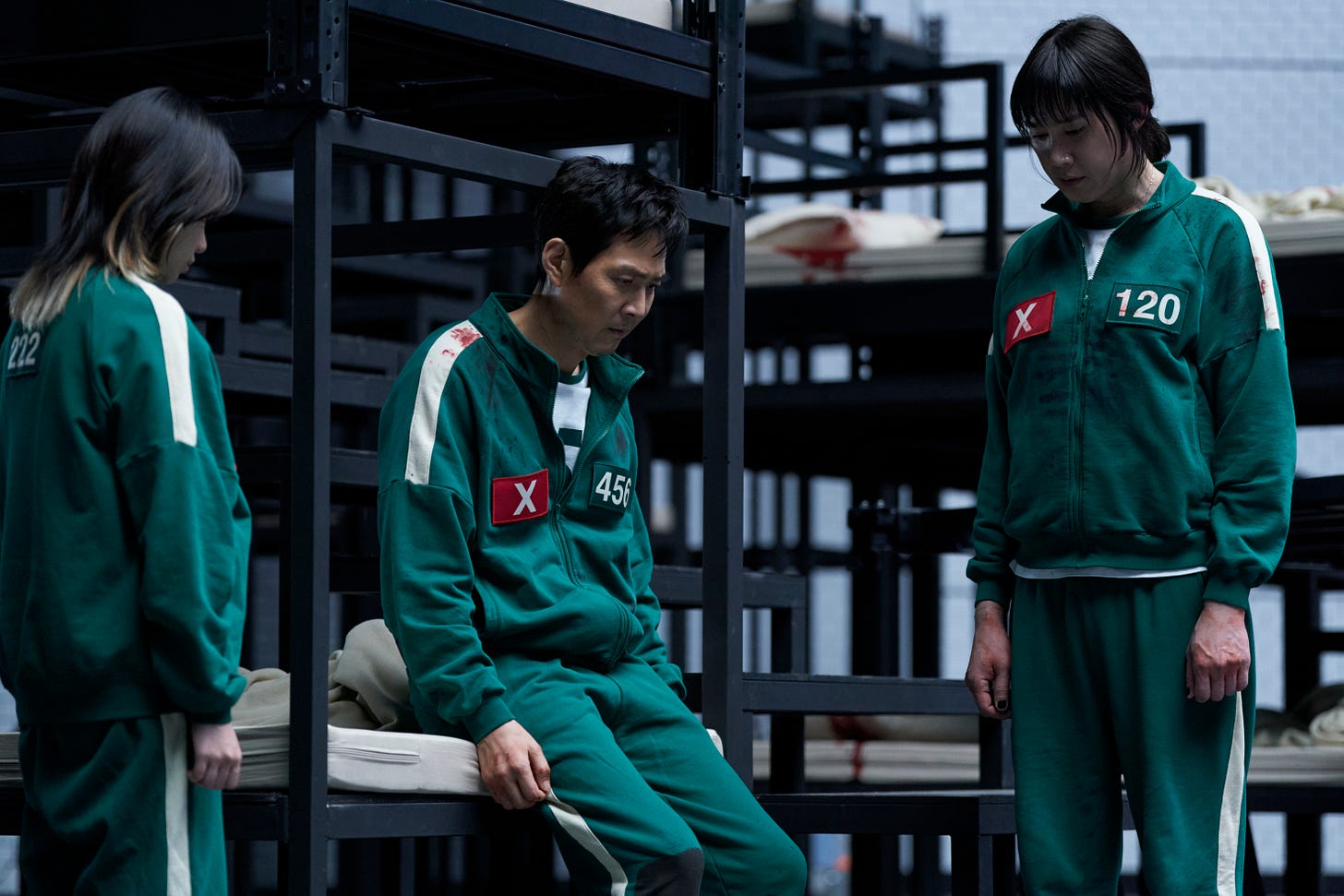
However, that universal appeal doesn't mean some specific cultural details didn't get lost in translation. Lee Jung-jae shares a memorable, if grimly amusing, example from the first season. "It's that scene where the character Seong Gi-hun is trying to take his own life in the bathtub. And you'll notice that he has lit a charcoal briquette, which is actually a very commonly known way of committing suicide in the Korean culture," he explains. "For Korean audiences, the moment you see it, you immediately know what's happening. But I realized to a lot of foreign audiences, they thought he was just enjoying a soothing bath... people thought, oh, he's trying to enjoy and relax with this therapy session, where in fact, this is supposed to be one of the most dramatic moments."
However, as Lee Byung-hun sees it, the show's power lies in its fundamental themes. "In terms of the fundamental issues and themes that are dealt with in Squid Game, no matter what cultural background or what language you use, I was very surprised to see how resonant it was universally." This realization, however, comes with a somber footnote. "That makes me very happy as someone who participated in it," he says. "But at the same time, to know that these very darker and heavier themes resonate with so many people around the world, it does feel, you know, it leaves a bitterness in your mouth too."
A Conclusion with an Opening?
Ending a story of this magnitude is a monumental task, and the finale was not always the one that was planned. Director Hwang Dong-hyuk reveals that the ending evolved significantly as the story and characters took on a life of their own. "When I had a vague idea about what kind of story I wanted to tell... I actually had a different ending in mind," he admits. "And then as I went through the writing process, as I drew out the map for Gi-hun's character arc, I realized this shouldn't be the way this story ends, and this is a better ending or the right ending for this arc. And so there was actually a very drastic change in the ending."
But even with a definitive conclusion, the question of a future for the franchise lingers. Is this truly the end of the Squid Game universe? Hwang suggests that while this chapter is closed, the book may not be entirely shut. "I guess you could say that in a way," he concedes when asked if the finale leaves the door open. "Because when you watch the finale, while it has a true closure, you know, you can still feel a sense of some kind of longing or lingering. So, I think, you know, maybe someday if the opportunity allows and the timing is right, maybe there's room for other stories."
Post Mortem
And so, the game is over. What began as a spectacle of survival evolved into a profound and unsettling inquiry into the human soul. The final season of Squid Game leaves its audience with the very questions its creators grappled with: In a world that seems to grow darker, is there still room for hope? Can we, as a species, find a way to trust one another and build a better world?
The show’s brutal games may have concluded, but its haunting reflection of our own society remains. Its true legacy is not the on-screen carnage or the shocking twists, but the "bitterness in your mouth" that Lee Byung-hun described—the uncomfortable recognition that these dark themes resonate so deeply across the globe.
The games might be over, and as Player 456’s journey comes to an end, I am reminded of this chilling truth:
He who fights with monsters should look to it that he himself does not become a monster. And if you gaze long into an abyss, the abyss also gazes into you.
- Friedrich Nietzsche, Beyond Good and Evil (1886)




